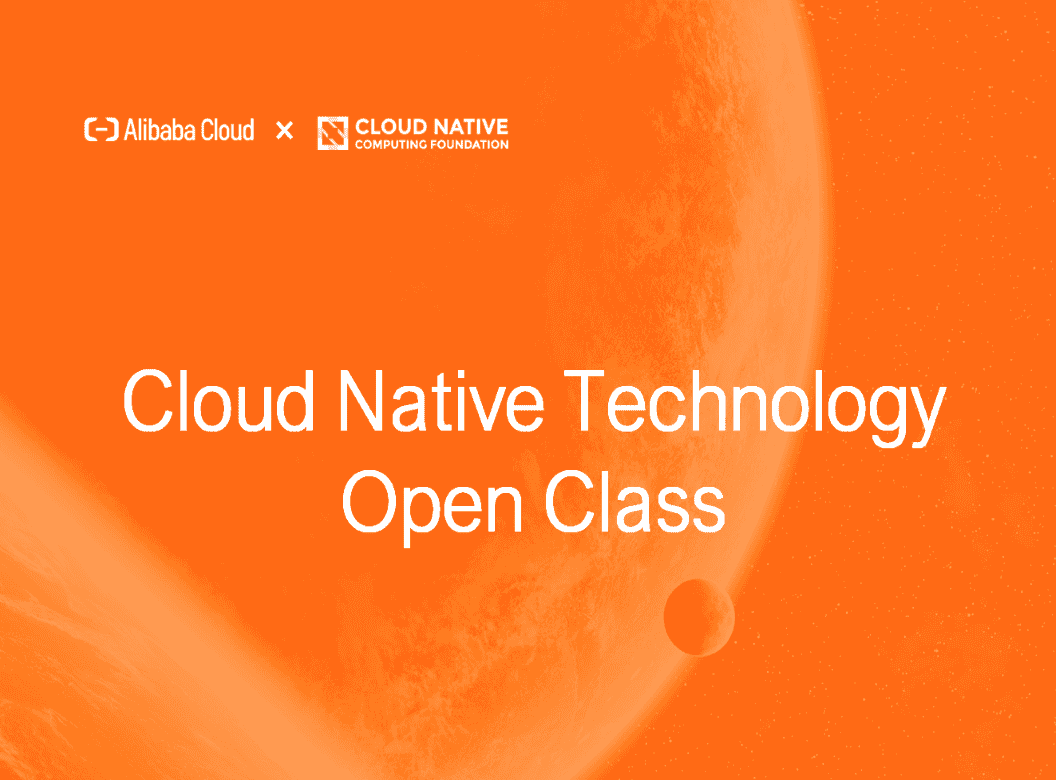Course Overview

The term Cloud Native was originally used to describe the typical architectures and characteristics of cloud-based applications. With the evolution of containers, Kubernetes, Serverless and FaaS technologies, the Cloud Native Computing Foundation (CNCF) defined Cloud-Native as a basic technology that makes applications more elastic, fault-tolerant, and observable. It can also make applications easier to write and orchestrate. This technology can enable developers to make the best use of cloud resources, products and delivery capabilities.
This course is jointly developed by Alibaba Cloud and CNCF. The entire course is free of charge and requires no registration. We will provide you with:
- A comprehensive knowledge system for you to build your own cloud-native skill set
- An understanding of Cloud Native's essence and key ideas
- An online testing for each chapter to verify your learning progress
- Key best practices in Cloud Native from technical teams on the cutting edge of this technology
- New hands-on experience for CNCF is available now, check here for setup guidance.
Target Audience

Software engineers and college students majoring in computer science and software engineering

Application developers using or looking to learn more about containers and Kubernetes

Software developers and technical managers with basic server knowledge looking to explore container technologies

Technical managers and developers who want to understand the basics of Cloud Native technologies
Stage 1: Cloud Native Technology Foundation
|
Course List |
Learning Benefit |
Video Course |
Self Test |
Hands-On Lab |
Course Content |
|
Lecture 1: Cloud Native First Class |
Understand the concept, nature and mainstream technology of Cloud Native |
Start Learning | Course Content | ||
|
Lecture 2: Basic Concepts of Containers |
Grasp the basic concepts of container, container images, and container data volume |
Start Learning | Test For Lecture 1-2 | Try Lab Now | Course Content |
|
Lecture 3: Core Concepts of Kubernetes |
Understand Kubernetes architecture, Kubernetes API primitives, clustering and deployment, service, and other concepts and basic operations |
Start Learning | Try Lab Now | Course Content | |
|
Lecture 4: Understand the Design Patterns of pods and containers |
Understand pod and container design patterns such as Ambassador, Adapter, and Sidecar |
Start Learning | Test For Lecture 3-4 | Try Lab Now | Course Content |
|
Lecture 5: Application Orchestration and Management Core Principles |
Understand Labels, Selectors, Annotations, and Kubernetes's core - the controller pattern |
Start Learning | Try Lab Now | Course Content | |
|
Lecture 6: Application Orchestration and Management Deployment |
Master the basics of deployment and understand horizontal scaling, rolling update and rollback of an application |
Start Learning | Test For Lecture 5-6 | Try Lab Now | Course Content |
|
Lecture 7: Application Orchestration and Management: Job and DaemonSet |
Master the use of Job, CronJob and DaemonSet |
Start Learning | Try Lab Now | Course Content | |
|
Lecture 8: Application Configuration Management |
Understand ConfigMaps, SecurityContexts, ServiceAccounts, and how to define application resource requirements as well as how to create and use Secret |
Start Learning | Test For Lecture 7-8 | Try Lab Now | Course Content |
|
Lecture 9: Application Storage and Persistent Volumes Core Knowledge |
Understand the basic concepts of PersistentVolume, PersistentVolumeClaim, StorageClass, operational usage, and internal working mechanisms |
Start Learning | Try Lab Now | Course Content | |
|
Lecture 10: Application Storage and Persistent Volumes Storage Snapshotting and Topology Scheduling |
Understand the basic concepts, operational usage, and internal workings of storage snapshots and topology scheduling in application storage and persistent data volumes |
Start Learning | Test For Lecture 9-10 | Try Lab Now | Course Content |
|
Lecture 11: Observability: Are Your Applications Healthy? |
Understand LivenessProbes, ReadinessProbes, container log collection, application monitoring, and how to Debug in Kubernetes |
Start Learning | Try Lab Now | Course Content | |
|
Lecture 12: Observability Monitoring and Logging |
Understand the selection and usage of monitoring and logging in Kubernetes |
Start Learning | Test For Lecture 11-12 | Try Lab Now | Course Content |
|
Lecture 13: Kubernetes Network and Policy Control |
Understand the use of Kubernetes basic Network model, Netns, mainstream Network solutions, and Network Policy |
Start Learning | Try Lab Now | Course Content | |
|
Lecture 14: Kubernetes Service |
Understand Kubernetes Services and NetworkPolicies |
Start Learning | Test For Lecture 13-14 | Try Lab Now | Course Content |
Lecturers

Scan Code
Join the Cloud Native technology discussion group















